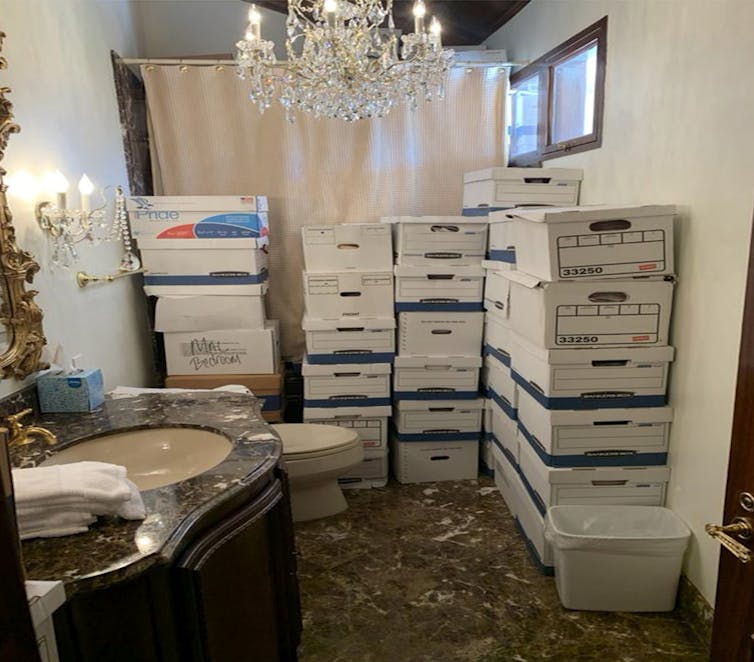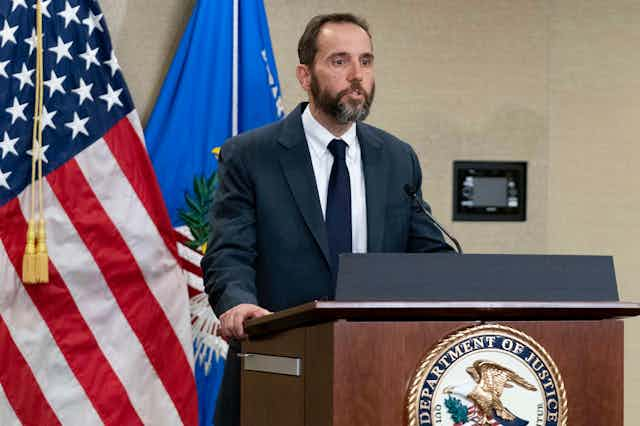Donald Trump and his allies have responded with a variety of objections to his federal indictment, brought in June 2023 by special counsel Jack Smith. The federal charges – the first against a former president – listed 37 counts of obstruction of justice and wrongful retention of classified documents after Trump left office in January 2021.
The objections made by Trump and his allies: The former president simply cannot be charged, the indictment is political “weaponization” of the justice system, the charges are groundless and the charges are unfair. The unfairness claim often involves a comparison to Hillary Clinton, Trump’s 2016 presidential opponent, who was not charged in an investigation into her handling of government documents.
As a scholar of secrecy law and a longtime national security practitioner, based on all that is known, I do not see merit in those claims.
A former president can be charged
Trump and his allies have argued that it is completely inappropriate for the former president to be charged.
But no part of the Constitution, no statute and no Supreme Court precedent sets a former chief executive above the law. Alexander Hamilton, writing in The Federalist Papers, stated the founders’ view that a former president is “liable to prosecution and punishment in the ordinary course of law.” Hamilton added that a former president would be no different in this respect from a state governor.
American history is replete with criminal charges against state officials, vice presidents – a former one during the founding era, and a sitting one in the 1970s – members of Congress and other prominent politicians.

Not a partisan prosecution
Trump is right that his is inevitably a sensitive case because of his continued presence in the political arena.
What he does not acknowledge is that maintaining the bedrock legal principle of equal justice requires avoiding twin hazards: politically motivated prosecutions and exempting elite politicians from the law.
Navigating these shoals is challenging because under the U.S. Constitution, the executive branch is headed by the sitting president, and it includes the Justice Department. That means there will always be at least a potential risk of “weaponization” of prosecution – or just the risk of that allegation – when the defendant is in a different party from the president.
But if a former president who is a political adversary of the current president cannot be charged, then that former president can commit any federal crime they please. That is the opposite of the founders’ intent, and not the law.
Sorting this out requires careful analysis of the facts and law.
Here, the “weaponization” allegation lacks substance. All it has are the circumstances of President Joe Biden’s position atop the executive branch, and Trump’s challenge to Biden’s candidacy. In contrast to President Thomas Jefferson’s detailed direction of the prosecution of political adversary and former Vice President Aaron Burr, there is no credible evidence that Biden is telling the prosecutor what to do.
The charges have merit
Trump claims that he had an “absolute right” to take the documents. In reality, when Trump left office he lost the presidency’s authority to possess presidential records and national security documents. The indictment presents strong evidence that the documents Trump held on to contained extremely sensitive secrets, including U.S. war plans, and that Trump knew it and worked to block recovery of all of them by the government.
By law, documents of former presidents and national defense information must be stored by the National Archives or other federal agencies. Instead, the indictment alleges that the former president stored classified information at the busy Mar-a-Lago resort in a room accessible from the pool, an office, ballroom stage, bathroom and shower.
The indictment lays out clear evidence of Trump’s knowing refusal over many months to comply fully with lawful requests, and a subsequent court-issued subpoena, for the return of all the documents. It includes pictures, and a recorded statement in which Trump checks all the boxes for criminal liability: knowing possession after leaving office of documents he calls “secret” and showing of those documents to people not authorized to see them – plus admitting that he could have declassified them while president but did not.
Not comparable to Biden, Pence or Clinton
That recording and other contents of the indictment will be powerful evidence at trial of Trump’s state of mind.
The law concerning government documents and national defense information requires willfulness for criminal liability – basically, keeping documents you know you should not. Other statutes criminalize lying to investigators, other obstruction of justice and getting others to commit crimes.
It is Trump’s alleged knowingness and obstruction that make complaints of unfairness fall flat.
President Biden and former Vice President Mike Pence both instructed aides to return documents with classification markings after such records were discovered in files that had been quickly packed and went home with the former vice presidents at the end of their terms as veep.
A federal investigation of Pence was dropped in June 2023. One of Biden likely will be, too. Both former vice presidents wrongfully retained national defense information, but not knowingly. Neither was obstructive.
In Trump’s 2016 campaign, he criticized former Secretary of State Hillary Clinton for her use of private email systems, including to send emails with classified information. The FBI concluded that she had been extremely careless rather than knowing or obstructing.
Echoes of Reality Winner and Edward Snowden

The evidence of Trump’s knowing retention of secret documents and obstruction makes his case quite like many in which people have faced fines or prison. Those include cases in which people once had lawful access to secrets but knowingly stole and shared them to make political points.
A junior Air Force linguist, Reality Winner, unlawfully removed one top-secret document and sent it to the media because she thought the public should know about it. Winner was prosecuted during Trump’s presidency and sentenced to five years in prison. The law in question? One of the same Espionage Act provisions under which Trump has been charged with over 30 counts.
Edward Snowden, the National Security Agency contractor who in 2013 leaked tens of thousands of classified documents to inform the public about secret U.S. surveillance activities, was also charged under another very similar section of the same statute before fleeing to Russia.
Trump’s case also looks a lot like those of other senior officials who have been prosecuted for knowingly mishandling secret documents, plus lying and other obstruction.
The indictment alleges that Trump, after leaving office, showed classified information to a biographer. That recalls then-CIA Director David Petraeus’ giving his biographer – who was also his lover – top-secret papers.
Both Trump and Petraeus were charged under the same Espionage Act sections and the same law criminalizing lying to investigators. After being fired as CIA director, Petraeus pleaded guilty to a lesser charge, paid a fine and got two years’ probation.
Trump’s situation strikes me as worse than Petraeus’. Trump’s documents are more numerous. Prosecutors allege that Trump’s were viewed by more people and were stored less securely. Trump’s obstruction also appears far greater.
A final category of cases also suggests Trump is in big trouble: the prosecutions of hoarders. There are multiple instances of U.S. intelligence personnel having been indicted, like Trump, for keeping troves of secret documents at home. Their mental health defenses failed. During Trump’s presidency, sentences in these cases included five years and nine years in prison.
Despite all of that, Trump and his allies will likely argue that indictment of a former president violates an important tradition against such prosecutions.
The real tradition is that former presidents tend not to break the law. The considerable evidence of the former president’s hoarding of secret documents and obstruction have forced the justice system either to exempt an elite politician from the law – or proceed with the well-merited prosecution that is now underway.

